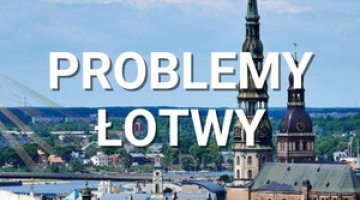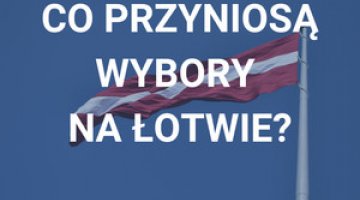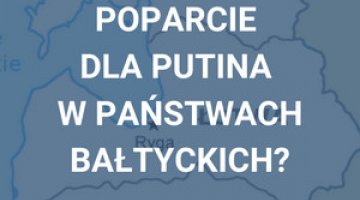Latvia: The ‘Russian’ party and the centre-right lead the polls in the run-up to parliamentary elections
Several days before the parliamentary elections in Latvia, which are due to be held on 2 October, the Harmony Centre – the party supported by the Russian-speaking electorate – is leading the polls, slightly ahead of the ruling centre-right. The majority of Latvian parties have not ruled out entering into a coalition with this party following the elections.
The Harmony Centre, a party supported by the Russian-speaking electorate, is leading the polls – holding a slight advantage over the ruling centre-right – a few days ahead of the parliamentary elections scheduled for 2 October. Most parties for which ethnic Latvians vote do not rule out entering into a coalition with that party after the elections. This would be an unprecedented move since ‘Russian’ parties have not been given access to the governing of the country since Latvia regained independence.
The centre-right Unity, a party led by the current prime minister, Valdis Dombrovskis, may also win the election and form the government again. Parties which represent the interests of Latvian oligarchs, whose influence on the way the country is governed has been strongest over the past few years, are likely to be a necessary element of the future coalition.
The Harmony Centre: the Russians are coming out of political isolation in Latvia
The Harmony Centre is a party dominated by Russians. It is popular among the Russian-speaking minority – predominantly Russians and also Belarusians, Ukrainians and Poles – which in total accounts for approximately 35% of Latvian residents (however around 40% of them do not have Latvian citizenship and therefore may not take part in elections). Over the past few years, the Harmony Centre has successfully taken over a majority of the Russian-speaking electorate in Latvia owing to the party’s dynamic leader and strong support from the Russian-language media in Latvia. The party led by Nils Usakovs, the first Russian to hold the post of mayor of Riga in the history of independent Latvia, is trying to present itself as a left-of-centre party, which represents the interests of all residents of the country, regardless of their ethnic backgrounds. The Harmony Centre has withdrawn from some of its previous proposals, which were controversial to ethnic Latvians, for example granting Russian the status of a second official language in Latvia. A change in its rhetoric has caused most Latvian parties, with the exception of nationalists and some right-wing parties, to no longer rule out a possibility of forming a government coalition with the ‘Russian’ party. This evolution of the Harmony Centre is a sign of its pragmatic policy, the main goal of which is to participate in the country’s government. Another fact, which should not be disregarded, is that the image change of the ‘Russian’ party in Latvia ran parallel to a change in Moscow’s policy towards Riga, which has recently become less confrontational and become more open to co-operation. A faction of those who represent the interests of the Russian minority in Latvia is criticising Usakovs’s party, claiming that it no longer protects the rights of Russians. However, according to the polls, their representatives – the Union for Human Rights in a United Latvia led by Tatiana Zhdanok – will not cross the 5% election threshold and may fail to enter parliament for the first time.
The oligarchs are losing some influence but are still in the game
Over the past decade, Latvian politics has been dominated by parties which are backed financially by Latvian oligarchs. Despite the commonly shared belief that the parties serve first of all the interests of the business network behind them, they still enjoyed support from a significant part of the electorate, who appreciated the parties’ pragmatism and efficient operation. The oligarch parties have uninterruptedly participated in all Latvian governments. Support for them fell significantly only as a consequence of the economic crisis which Latvia plunged into two years ago. The fact that the parties won fewer votes than before in the local and European Parliament elections last year as well as in the results of public opinion polls showing a continuing fall in approval ratings for the parties came as a warning to oligarchs that their parties might not enter the Saeima. This May, two of those parties led by Andris Skele, the former prime minister, and Ainars Slesers, the present deputy mayor of Riga, decided to join forces and create one party: For a Good Latvia. Marketing tricks, generous funding of the campaign and support from friendly media are likely to allow the party to cross the electoral threshold and ensure the oligarchs parliamentary representation. The Union of Greens and Farmers, which is ranked third in the polls, also stands a chance of achieving a good result in the upcoming election. This party represents the interests of Aivars Lembergs, who has been governing Venstpils for more than two decades. Owing to his efficient rule of the region and in spite of corruption charges brought against him, he may traditionally count on a large support for his party in central and western Latvia.
The centre-right hopes for victory
Beside the Harmony Centre, the most serious candidate for victory in the elections is the centre-right Unity, the largest party in the present government coalition. This party is presenting itself as an alternative to oligarch rules and the only force capable of surpassing the Russians, who are leading the polls. If Unity wins, one of its leaders, the current prime minister, Valdis Dombrovskis, will again receive the opportunity to form a cabinet. However, to achieve parliamentary majority, Unity will have to be supported by either one of the oligarch parties (at present, it is co-governing with Lembergs’s party) or the Harmony Centre.
Appendix
Support for political parties a week ahead of the elections (according to Latvijas Fakti)
|
Party
|
Characteristics
|
Support according to Latvijas Fakti (29 September 2010)
|
|
Harmony Centre (Saskanas Centrs)
|
Russians have a dominant position in the party. The party’s leader is the present mayor of Riga, Nils Usakovs. The party presents itself as a left-of-centre party and uses populist slogans of protection for the poorest. Electorate: Russian-speaking population.
|
21%
|
|
Unity (Vienotiba)
|
An alliance created before the elections consisting of the three centre-right parties on which the present government of Valdis Dombrovskis is based. They present themselves as an alternative to oligarch rule and to the Harmony Centre. Electorate: ethnic Latvians.
|
19%
|
|
Union of Greens and Farmers (Zalo un Zemnieku Savieniba)
|
A party which represents the interests of the mayor of Ventspils, Aivars Lembergs. Electorate: ethnic Latvians.
|
10%
|
|
For a Good Latvia (Par Labu Latviju)
|
An ‘oligarch’ alliance created before the elections consisting of two parties whose leaders are the former prime minister Andris Skele and the present deputy mayor of Riga Ainars Slesers. Electorate: ethnic Latvians and Russian-speaking population.
|
7%
|
|
All for Latvia and For Fatherland and Freedom (Visu Latvijai – TB/LNNK)
|
An alliance of two parties: All for Latvia (nationalists who have influence among a section of Latvian young people, for example, they organise marches to commemorate Latvian Waffen SS Legions) and For Fatherland and Freedom (parliamentary right-wing, rules out any possibility of co-government with the Harmony Centre). Electorate: ethnic Latvians.
|
5%
|
|
Union for Human Rights in a United Latvia (PCTVL)
|
A party which defends the rights of the Russian minority in Latvia. It is politically isolated because of its radical views. Electorate: Russian-speaking population
|
3%
|
30% of voters either have not yet decided which party they will vote for or will not participate in the elections at all.





